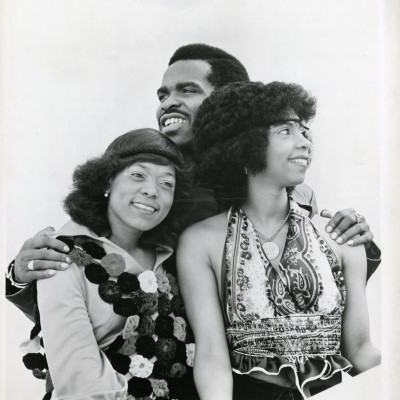While his liner notes to the Undisputed Truth’s second album called them “the fastest rising group in the recording industry” and “a perfect cross between Sly and the 5th Dimension,” producer Norman Whitfield’s habit of making them his laboratory to try out new ideas and arrangements of others’ songs – including his own — obscured the group’s obvious vocal talents, even if one of those covers, “Smiling Faces Sometimes” resulted in a monster Motown classic.
FAST FACTS:
- First Hit: “Save My Love For A Rainy Day”
- Biggest Hit: “Smiling Faces Sometimes”
- Biggest Album: The Undisputed Truth
- Career Highlight: “Smiling Faces Sometimes” – which Motown historian Nelson George called “a dark, paranoid record that showed Norman had his finger on the public pulse”– became one of the biggest (and, by some measures, the biggest) records in the country during the Summer of 1971, and the Undisputed Truth become an in-demand act.
Unfairly saddled with a reputation as an act to whom Whitfield tosses warmed-over renditions of Temptations’ material, the Undisputed Truth’s best known songs are often the most full-realized versions of his compositions. In the group’s first incarnation, these covers meet the earthy vocals of Joe Harris and contrasting soaring voices of Billie Rae Calvin and Brenda Joyce Evans and the group regularly rises to the occasion. “Norman Whitfield writes for both the Temptations and us,” Calvin tells a music journalist during the Truth’s prime. “I think he recuts his songs because he can see them in so many different ways and he wants to record them in different ways, too.”
The Undisputed Truth’s saga begins in the late 1960s as Motown singer, writer and producer Bobby Taylor brings the veteran South Central Los Angeles group the Delicates to the company following their string of single releases. But shortly afterward, the group’s founder and lead singer Darlene Walter departs, leaving Evans and Calvin behind. Various Motown producers begin using the pair as background singers on sessions – such as for Diana Ross’s “Ain’t No Mountain High Enough” and the Four Tops Still Waters Run Deep album. Whitfield uses them on Edwin Starr’s gigantic hit, “War.”
Around the same time, Joe Harris – best known around Detroit as a co-lead singer of the Fabulous Peps – is looking for a new group. Whitfield, who is enjoying huge success with the Temptations’ new psychedelic soul sound, gets the idea to team Calvin and Evans with Harris in part, he’d later say, as a response to critics claiming Motown had grown stagnant. Some suspect Whitfield is also motivated by whispers that he can only get hits with established acts.
Not only does Whitfield furnish the new group with material that both stretches the boundaries of the classic Motown Sound and taps into multi-lead psychedelic soul, he also creates a unique look for the trio. As Motown historian Bill Dahl would write, “Norman tried to appeal to a psychedelic sensibility by outfitting his protégés in headbands and hippie threads that eventually gave way to white afro wigs and metallic painted faces.”
In the studio, Whitfield and his partner Barrett Strong start out by recycling and re-recording tracks used on other Motown artists, crafting new vocal arrangements for the new group’s initial efforts. The first Undisputed Truth single, a rearrangement of the Temptations’ album track “Save My Love For A Rainy Day,” has their vocals recorded over a track Whitfield originally intends for Marvin Gaye as a follow-up to his hit “Too Busy Thinking About My Baby.” Released on the Gordy label in February ’71, the Undisputed Truth makes it their R&B chart debut, topping out at Number 43.
“Whit” and The Truth get right back in the studio for the follow-up the same week in March that “Rainy Day” peaks for their next single. Norman selects a sinister-sounding track he’s planning to release on the Temps’ forthcoming album Sky’s The Limit. In the re-working of “Smiling Faces Sometimes” for The Undisputed Truth, Joe Harris later recalls, “It took me 40-50 takes before I got it,” but he gets it perfectly. As Bill Dahl later writes, “Harris brought an intimacy to his lead vocal that made it seem he was sharing a secret.” Combined with “Billie and Brenda commiserating one minute and piping up in their own behalf the next,” the record captures the spirit of suspicion that descended on the U.S. during the Nixon era. Released in May, the song explodes on Billboard to Number 2 on its R&B chart and Number 3 on its Pop chart, while Cash Box has “Smiling Faces Sometimes” topping both of its charts.
In July, The Undisputed Truth LP is released on Gordy and, on the strength of both the monster single (which stays on the charts for over four months) and Whitfield’s experimental production, it also sells well, reaching Number 43 on the Billboard Pop Album chart.
Whit sees follow-up potential in covering another Temps album track of his, “You Make Your Own Heaven and Hell Right Here On Earth.” Employing the same wary tone and leery pace that proved effective on “Smiling Faces Sometimes,” it charts at Number 24 R&B and Number 72 Pop.
The New Year 1972 sees both a new single and new album by The Undisputed Truth. The LP entitled Face To Face With The Truth and it peaks at Number 16 on the R&B LP chart and 114 on the Pop LP chart.
The next Truth single “What It Is?,” comes right off the Face To Face album. Once again, this funky 45 covers a Temptations song (from their new Whitfield-produced LP Solid Rock, released the same day as Face To Face). The Truth’s equally funky version has a slightly slower rhythm but it still makes the charts, hitting Number 35 R&B and Number 71 Pop.
In the UK and a few other European countries, Tamla Motown releases “Superstar (Remember How You Got Where You Are)” from Face To Face as a single by the Truth, another cover of a Temps song. This single does not chart there.
Finally, Motown releases a track by the Truth in May that has not previously been released by the Temps or another act Whitfield produced — but ironically, “Papa Was A Rolling Stone” will be later be covered by the Temps and become one of their biggest hits. Contrary to the legend, Whitfield’s lyrics were modeled on Joe Harris’s father, not the father of the Temps’ Dennis Edwards. This first version of “Papa” has Harris sounding suitably mournful and much like the great Chicago soul singer Jerry Butler. With a bassline rooted in Donny Hathaway’s hit “The Ghetto,” it charts at Number 24 R&B and Number 63 Pop.
Another original Whitfield single, “Mama I Got A Brand New Thing (Don’t Say No),” is scheduled for release in late ’72 but it’s delayed in favor of “Girl You’re Alright,” a collaboration by Motown staff writers Mike Valvano, Frank Wilson, Clay McMurray and Pam Sawyer on which Harris again does his Jerry Butler thing on a more traditional soul ballad. It crests on the R&B chart at 43 but only bubbles under the Top 100 at 108.
Whitfield’s uptempo “Mama I Got A Brand New Thing (Don’t Say No)” gets a shot in early ’73 and also performs modestly, making it to Number 46 on the R&B chart.
A new Undisputed Truth LP Law Of The Land hits the streets in June ’73 and the title track – an energetic version of a Whitfield composition also recorded by the Temps for an LP released three months earlier – becomes their next single. It reaches Number 40 on the R&B chart and 191 on the Pop LP chart. Law Of The Land, which also has covers of songs by Roberta Flack, the Beatles, Traffic and Al Green, broadens the group’s repertoire while allowing Whitfield to experiment with other’s material.
Brenda Joyce Evans leaves the group in ’73 and is replaced by Diane Evans. Her tenure is short and Whitfield takes her departure as a cue to remake the Truth. Harris and Calvin are joined by Tyrone Douglas, Tyrone Barkley and Virginia McDonald. Eventually, Calvin departs, too.
A snappy Whitfield original, “Help Yourself,” gives the Truth a boost as the single, released in February ’74, returns them to the Pop charts, cresting at Number 63 and reaching Number 19 on the R&B charts.
Whitfield’s “I’m A Fool For You,” released in June, follows “Help Yourself onto the R&B chart, rising to Number 39. Both songs are on the next Truth LP, Down To Earth, released in July and they are the last Undisputed Truth singles to reach the charts.
The group’s visual image evolves; years later, Motown historian Graham Betts will describe the shift to huge white wigs and painted faces as “something of a funky looking Kiss.” Their musical identity changes too, incorporating George Clinton/Parliament, Curtis Mayfield and Jimi Hendrix as inspirational ingredients. On the Cosmic Truth album, released in February ’75, Whitfield uses this incarnation of the Undisputed Truth to continue probing music’s cutting edge while again updating the Classic Motown Sound on familiar material like “(I Know) I’m Losing You” and injecting Neil Young’s “Down By The River” with some psychedelic soul. The album hits both the Pop LP (Number 186) and R&B LP (Number 42) charts.
“Lil’ Red Riding Hood” is released as the first single in advance of Cosmic Truth but does not quite make the Top 100, reaching Number 106. A second single, the rocking dance number “Earthquake Shake,” is scheduled but not released In the U.S. (although it is released in Europe). However, “UFO’s” – part comedy, part commentary, all through a gauzey audio prism — does fly off the LP stateside in August ‘75 – a few months before the riotous sci-fi funk of Parliament’s Mothership Connection takes off — and it rises to Number 62 on the R&B chart.
A final Undisputed Truth Gordy LP Higher Than High is released in September ‘75 and the title song becomes their final charting Gordy single, climbing to Number 77 on the R&B table.
When Whitfield departs Motown to form his own label as 1975 ends, The Undisputed Truth depart with him. They undergo regular personnel changes and Taka Boom, sister of Chaka Kahn, joins the group for a period, although Joe Harris remains the lone constant member amidst all the arrivals and departures.
The Truth record two more LPs for the Whitfield label, having some immediate success with the Taka Boom-led “You+Me=Love” in ’76, which soars to Number 5 on the Dance charts while topping out at 48 Pop and 37 R&B respectfully. It also becomes the only Undisputed Truth record to chart in Great Britain, reaching Number 43.
Motown releases The Best of The Undisputed Truth LP in 1977.
When Whitfield Records disbands in the early 1980s, so does The Undisputed Truth, although Harris and Brenda Evans reunite in 1990 and are joined by Belita Woods to reform the group as a trio and record for Ian Levine’s Motorcity Records.
In 1995, Motown releases a 20-track CD Milestones: The Best of the Undisputed Truth, compiling singles and album cuts.
In 2002, Spectrum Music puts out the CD Undisputed Truth: The Collection which collects A-sides and a few B-sides on its 19-tracks from their Motown years.
In 2003, Motown releases the 12-track compilation CD Smiling Faces: The Best of The Undisputed Truth, which contains mostly singles and a couple of album cuts.
The Undisputed Truth are inducted into the R&B Hall Of Fame in 2015.
Kent Records in the UK released three complications of Undisputed Truth material in 2017, each a two-CD set. One set, Nothing But The Truth, included the entire Undisputed Truth and Law Of The Land Gordy LPs with most of the Down To Earth Gordy album plus selected single mixes. The second two-CD set combined the Cosmic Truth and Higher Than High Gordy albums. The third set combined the group’s two LP’s for Whitfield Records, Method To The Madness and Smokin’.





